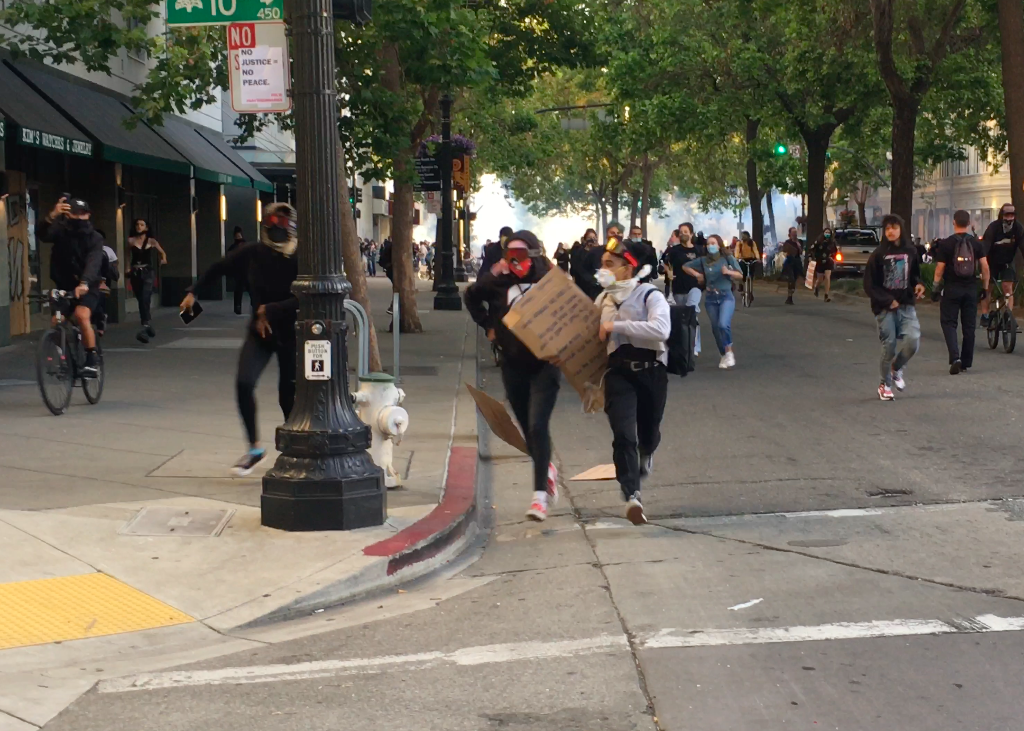
Protesters flee on foot as law enforcement fires tear gas and so-called “less lethal” weapons at the end of a Justice for George Floyd protest in Oakland on June 1. Photo by KPFA’s Ariel Boone.
On this show:
0:08 – The first death from Covid-19 inside an ICE detention center took place in Otay Mesa Detention Center in San Diego. We speak with Anthony Alexandre, who is currently being detained at the CoreCivic-run facility, and led a hunger strike inside earlier this year. Alexandre reports being exposed to confirmed cases of Covid-19 at least twice since inside, and says immigration status should not be a death sentence during the pandemic. Alexandre also says ICE is vastly underreporting the number of cases inside Otay Mesa.
0:17 – A new Reuters investigation follows asylum seekers who are dropping their cases in order to flee for their safety — from Covid-19. Immigrants in detention with medical vulnerabilities fear death from the virus and are reporting immigration officials are encouraging them to sign for their own deportation, to try to avoid the virus. Laura Gottesdiener (@Gottesdiener), a reporter for Reuters in Monterrey, Mexico. You can read her investigation here.
0:33 – Yesterday, Mexico’s COVID-19 death toll reached 30,000, making it the country with the fifth-highest number of officially reported deaths. Shannon Young (@SYoungReports) reports from Oaxaca.
0:41 – We turn to Yemen, where a five-year civil war and devastating U.S.-supported bombing campaign by Saudi Arabia continue to cause a humanitarian disaster, destroying the country’s health infrastructure and leaving it unprepared to handle the coronavirus. KPFA’s Rami Almeghari reports.
0:48 – Laura Carlsen (@lauracarlsenc) discusses the politics and economics of COVID in Mexico and President Trump’s upcoming meeting with with Mexican President Andres Manuel Lopez Obrador. She’s the director of the Mexico City-based Americas Program, a fiscally sponsored program of the Center for Economic and Policy Research.
1:08 – The Supreme Court let stand a lower court decision that blocked construction of part of the Keystone XL Pipeline in Montana, a pipeline long targeted by climate activists; a federal judge ruled that the Dakota Access Pipeline operated by Energy Transfer Partners must shut down and empty itself of oil within 30 days; and Dominion Energy and Duke Energy have cancelled their plans to build the Atlantic Coast Pipeline, deciding it was no longer profitable. Environmental advocates count these as major victories against polluting, extractive projects, after years of resistance largely led by indigenous organizers. We speak with Antonia Juhasz (@AntoniaJuhasz), a Bertha Fellow in investigative journalism, part of a global team of journalists investigating climate, fossil fuels and corporate power. Her most recent book is Black Tide.
1:33 – On June 1, 2020, at the end of a youth-led Justice for George Floyd demonstration and 20 minutes before Oakland’s curfew, the Oakland Police Department tear gassed protesters. The police claim it was justified and provoked. But what really happened that evening? We’re joined by three journalists from nonprofit newsroom The Oaklandside, Darwin BondGraham (@DarwinBondGraha), Sarah Belle Lin (@SarahBelleLin) and Jonah Owen Lamb, who used visual evidence to investigate police conduct at the protest and compare it to police and city statements and policies. Read their investigation here: “Did OPD violate its own policies against protesters?”

